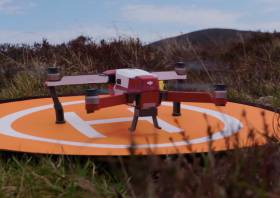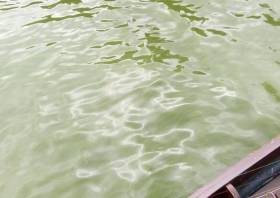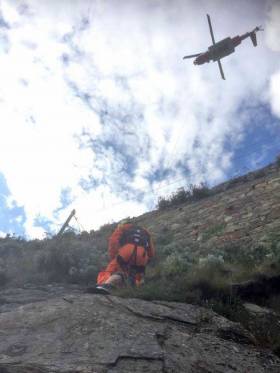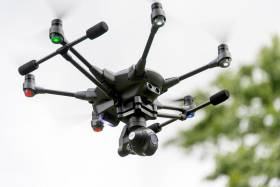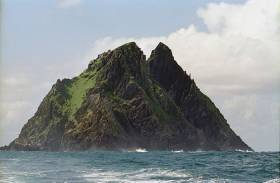Displaying items by tag: Drones
Drone Firm Touts Successful Test of AI-Powered Aircraft in Italian Coastguard Exercise
A Portuguese drone company has confirmed the successful deployment of an inflatable lifeboat from one of its drones as part of an exercise with the Italian Coast Guard.
According to Marine Industry News, the Tekever AR5 drone — which resembles a fixed-wing aircraft — has sensors to detect vessels or people in the water below, as well as environmental conditions, and uses artificial intelligence to calculate the optimal time and position to release its lifeboat such that its deployed at a safe distance.
“Beyond detecting people in distress, this life-saving capability represents a key role in search and rescue missions with the aim of improving maritime safety and reducing the 2,500 marine casualties and incidents reported by EU member states each year,” the company says.
Drone technology has been tested by the Irish Coast Guard and RNLI for its various applications in life-saving emergency responses.
The RNLI has partnered with the UK’s Royal Life Saving Society to test the use of drones in emergency responses.
As Marine Industry News reports, RNLI lifeguards in Cornwall have been using a waterproof drone from Swell Pro to help observe bathers in the water as well as broadcast safety messages.
The specialised drones also have the potential to deploy lifesaving devices such as inflatable buoys to assist casualties.
Crantock Beach in Newquay, where the drone service developed with Eagle Eye Innovations is being tested, is divided by the River Gannel which makes the area difficult to patrol by conventional means.
“The drone will allow the lifeguards to undertake rapid observations across a wide area,” says lifeguard operations manager Peter Dawes.
Marine Industry News has more on the story HERE.
The Irish Coast Guard has shared video of a drone-assisted rescue in Cork Harbour which it says illustrates the increasing importance of new technology in emergency responses.
As previously reported on Afloat.ie, Crosshaven RNLI rescued a woman who was cut off by the tide at White Bay on Tuesday evening (11 October).
The lifeboat crew were able to quickly reach the casualty as they were guided by the drone launched by Guillen Coast Guard Unit, the IRCG says.
Lights on the drone were also used to illuminate the area as the volunteers recovered the casualty, Guillen Coast Guard adds.
The IRCG says this was one of two rescues in recent days — the other in Clogherhead, Co Louth — where unmanned aircraft systems (UAS) “successfully and quickly located casualties in dangerous and inaccessible locations requiring extraction by either boat or helicopter”.
The use of drones could play a key role in sustainable coastal fisheries in Ireland, according to a new study.
As the Irish Examiner reports, researchers at University College Cork (UCC) evaluated a wide range of applications for drones on the Irish coast, and highlighted a number of potential important uses.
These run from monitoring illegal fishing activity to studying pollution, surveying areas at risk of erosion or even identifying new viruses transmitting among marine wildlife — as well as supporting some of the UN’s Sustainable Development Goals.
Drone patrols have already been cited as more important than ever for the protection of Ireland’s inland fisheries following an increase in illegal fishing and angling activities recorded last year, as previously reported on Afloat.ie.
“The speed of development in drone technology means it can be difficult for many people to appreciate its current potential,” UCC’s Dr Samuel Hayes said.
The Irish Examiner has more on the story HERE.
Dun Laoghaire Coastguard Chosen For Drone Operations On East Coast
The Irish Coast Guard’s Dun Laoghaire unit has been chosen to pilot drone operations covering the East sector.
Training is set to commence early in the new year using DroneSAR, a software platform developed by a Donegal-based team to employ commercially available drones as part of search and rescue missions.
Once this training has been completed, the coastguard crew say they will be available to assist with missing person searches.
The news comes just months after the UK’s Maritime and Coastguard Agency announced its own 12-month drone trial to support its search and rescue actions on the Essex coast.
Toxic ‘Algae’ Threatens Wildlife In Killarney Lake
#Toxic - Pet owners have been advised to be vigilant over an outbreak of toxic blue-green ‘algae’ in a Killarney lake, as The Irish Times reports.
Lough Leane has been signposted by Kerry County Council over the presence of Cyanobacteria that has turned the waters a soupy pea-green colour.
A number of dogs died after exposure to the bacteria during a previous bloom on the lake shore in 2016.
Suspected similar cases have also been reported at Lough Mask as well as waterways further east, including Ballymore Eustace on the River Liffey.
Meanwhile, scientists at the Galway-Mayo Institute of Technology are preparing to use drones to test the water quality of lakes on the West Coast.
GMIT’s Marine and Freshwater Research Centre has secured €132,000 in funding from the EPA for the scheme that will allow for real-time feedback of camera images and data.
Licensed drone pilots will work with lake biologists and water scientists on the two-year project, part of Ireland’s mandate under the EU’s Water Framework Directive.
The Irish Times has more on this story HERE.
Coastguard Rescue For Woman Stranded While Retrieving Drone From Killiney Cliff Face
#Rescue - Drone owners will be mindful of where they fly their devices after a woman was stranded on a cliff face in Killiney while trying to recover one of the mini aircraft.
Dublin MRCC received a 112 call on Tuesday (15 August) from a father whose daughter was stuck on the cliff at Whiterock, after she had attempted to retrieve the drone he had been test flying before it crash landed.
Dun Laoghaire Coast Guard were deployed to the scene along with the Dublin-based Irish Coast Guard helicopter Rescue 116. A request was also extended to the Greystones Coast Guard Cliff Unit to assist.
A Dun Laoghaire coastguard volunteer reached the woman, who had found herself stuck some 30 feet from the cliff base, and made her comfortable until Rescue 116 prepared their winch man to lower her to the beach below. No injuries were reported.
Drone Revolution For Search & Rescue Around Ireland’s Coast
#Drones - Remote-piloted aircraft or ‘drones’ could revolutionise search and rescue operations around the Irish coast, as the Southern Star reports.
Following a demonstration by Civil Defence Ireland to West Cork emergency services last week, the Irish Coast Guard and others are now exploring how to utilise drone technology in their SAR efforts.
“It’s an ideal resource in areas like West Cork where you have a lot of upland terrain and rocky headlands as well as huge stretches of coastline,” said civil defence officer Niall Twomey.
“The drone can get into these places much faster than searchers on the ground and do it safely too so it can be a huge assistance.”
Twomey is part of a new project developing drone-based search teams across Ireland, two of which are based in Cork at Skibbereen and Kinsale, utilising the heavy-duty Typhoon H remote-piloted aircraft.
The Southern Star has more on the story HERE.
Skellig Michael Drone Film Shoot Criticised
#SkelligMichael - The Department of Heritage has approved a film shoot by drone at Skellig Michael, despite the use of drones being prohibited on the island.
According to The Irish Times, a guide on the Unesco world heritage site has raised concerns that permission for the Fáilte Ireland shoot would make a general ban on the use of drone aircraft by visitors difficult to enforce.
“How can we instruct the public not to fly drones if it will be clear that a tourism body has been permitted to do this extensively?” said the guide, who claimed anonymity.
Previously, an experienced guide spoke out over the controversial Star Wars shoots on the island last year.
The filming for box office hit The Force Awakens and next year’s Episode VIII attracted worldwide attention to the Co Kerry islands, which have since been promoted as a tourism attraction for Star Wars fans by Fáilte Ireland.
The Irish Times has more on the story HERE.
Bird's Eye Views Of Ireland's Beauty From Lough Eske To Dublin Bay
#Drones - Filmmakers have been using consumer-grade drones to capture some stunning footage in recent times, and this incredible video of Lough Eske is no exception.
Spanish video company eldrone.es launched from the grounds of Solis Lough Eske Hotel in Donegal to capture the breathtaking beauty of the lake in glorious 4K quality.
Meanwhile, Irish Rail released a similarly sweeping aerial view of the recently refurbished Drogheda Viaduct, after €6.1 million of EU-funded works that saw the installation of a new drainage system, waterproofing and state-of-the-art lighting.
It's a fitting facelift for Sir John MacNeill's engineering marvel that has spanned the River Boyne for 160 years.
Aerial photographer Dennis Horgan may not use a drone for his vistas, opting for helicopters and fixed-wing aircraft to get in position for the right shot, but his latest images captured over Dublin Bay are all the more impressive for it.
Indeed, a number of Dublin's waterfront landmarks appear in TheJournal.ie's gallery of his bird's eye view of the capital, many seen from unusual angles.



























